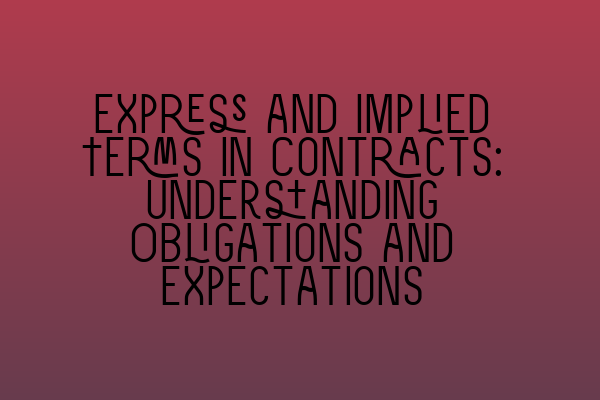Express and Implied Terms in Contracts: Understanding Obligations and Expectations
Welcome to our blog post on express and implied terms in contracts. Contracts form the foundation of many commercial transactions and legal relationships. Whether you are a business owner, a freelancer, or an individual entering into an agreement, understanding the different types of terms in a contract is essential to protect your rights and ensure clarity in your obligations and expectations.
What are Express Terms?
Express terms are explicitly stated provisions that the parties include in a contract to outline their rights and obligations. These terms can be in writing, verbally agreed upon, or even implied through the parties’ conduct. They are called “express” because they are openly communicated and leave no room for interpretation or debate.
Typical examples of express terms include the price, payment terms, delivery details, warranties, and termination clauses. These terms are crucial as they define the core elements of the contract and establish the framework for the parties’ performance.
For a more comprehensive understanding of express terms, you can refer to our SQE 1 Practice Exam Questions that cover various scenarios and test your knowledge.
Implied Terms: Unspoken but Legally Binding
Unlike express terms, implied terms are not explicitly stated in the contract. However, they are considered to be part of the agreement by law, either through common law principles, statutory provisions, or the parties’ intentions.
Implied terms can arise from the nature of the relationship between the parties, customary trade practices, industry standards, or even legislation. These terms fill in the gaps left by the express terms and ensure fairness and reasonableness in the contractual relationship.
If you are preparing for the SQE exams, our SQE 1 Practice Mocks FLK1 FLK2 can provide you with valuable practice and help you understand how implied terms are applied in different contexts.
The Importance of Understanding Obligations and Expectations
Understanding the obligations and expectations outlined in a contract is crucial to prevent misunderstandings, disputes, and potential breaches. Both express and implied terms work together to define the parties’ responsibilities and ensure a fair and balanced contractual relationship.
By clearly defining the terms, parties can set realistic expectations, allocate risks, and protect their respective interests. It also enables parties to anticipate potential problems and establish procedures for resolving conflicts, thereby enhancing the overall efficiency and effectiveness of the contract.
To prepare for the SQE exams or gain further knowledge in contract law, you may consider enrolling in our SQE 2 Preparation Courses or SQE 1 Preparation Courses. Our comprehensive courses cover various aspects of contract law and provide you with the necessary foundation to succeed in your legal career.
Conclusion
Contracts are legally binding documents that require a clear understanding of express and implied terms. Express terms lay out the specific rights and obligations agreed upon by the parties, while implied terms fill in the gaps to protect fairness and reasonableness. Understanding these obligations and expectations is crucial to ensure a smooth contractual relationship.
If you are preparing for the SQE exams, don’t forget to check the relevant exam dates on our website: SRA SQE Exam Dates.
We hope this blog post has provided valuable insights into express and implied terms in contracts. If you have any questions or need further assistance, feel free to contact our team of experts at SQE Contract Law.
